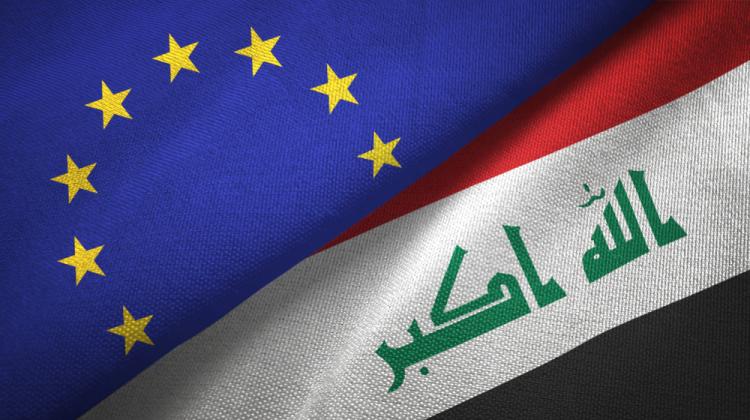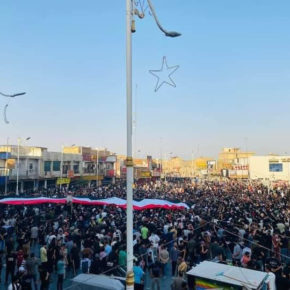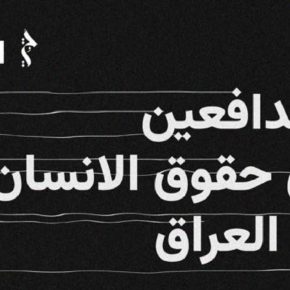The U.S.-Iran Crisis: Impact and Implications for the Region, Europe and Beyond
The following is a summary and synthesis of an article by and an interview with Kawa Hassan, vice president of EastWest Institute’s Middle East and North Africa (MENA) program.
Complete transcripts and audio can be found here:
https://www.eastwest.ngo/idea/hassan-speaks-epc-policy-dialogue-impacts-us-iran-crisis-iraq
https://www.eastwest.ngo/idea/hassan-calls-international-mediation-iraq-crisis

Sources of the crisis: past and present
In order to understand and resolve the crisis in Iraq, we must first untangle, as best we can, the various threads of foreign intervention, past and present. Clarity about different interests and their potential impact on Iraqis is essential so that intervention can benefit all Iraqis and realize a lasting peace in the country.
Hassan begins with three key foreign actors: the US, Iran and the EU. What are the implications of the proxy war between the U.S. and Iran on the stability, sovereignty and ongoing protest movement in Iraq, and what role can the EU play to de-escalate the conflict? The recent U.S. strike which killed not only Soleimani, also killed Soliemani’s Iraqi counterpart, Abu Mahdi al-Muhandis, the powerful deputy head of Al Hashd Al Shabi or Popular Mobilization Units (PMU). Thus the killing of al-Muhandis dealt a severe blow to the PMU and as such left a big leadership gap that will be difficult to fill. It still too early to exactly comprehend how his death will impact the future of PMU in particular and Iraq in general, but the killing of both these leaders, as well as the Iranian attack on U.S. bases in Iraq, have diverted international and regional attention from the biggest mass social movement in the modern history of Iraq.
The youth-led protest movement has shown a considerable resilience and even escalated its pressure on the government to meet its most immediate demands: establishment of a transitional government to be led by an independent politician from outside of the political class and holding of early elections under international supervision. But day by day, the conflict gets bloodier and more complicated. If the current repression continues, the peaceful protest movement—or part of it—might decide to take up arms to defend unarmed demonstrators, causing the situation to spin out of control.
Given the potential for an ever increasing escalation violence, it is imperative to understand that while the US strike and the Iranian response have shifted political alliances and created a power vacuum in the PMU, these recent events are not the source of the larger problems Iraq faces. The real crisis in Iraq is not the proxy war between Iran and the U.S., but the erosion and decaying of a corrupt political order that led to the eruption of mass protests in October. The post-2003 order created an oligarchy that enriched itself, impoverished the majority of the population, and deprived the country of its sovereignty. This is the root cause of Iraq’s predicament and not the conflict between the U.S. and Iran, nor the presence of U.S. and coalition troops.
Recommendation for resolution: an international conference
Iraqi leaders have thus far failed to provide a clear way out of the current political crisis, and while the protest movement is so far resilient, it alone can’t compel the political class and government to implement its demands. The right form of internationalization of the Iraqi issue could effectively de-escalate the regional crisis and help Iraqis to agree on a roadmap that meets the demands of the protest movement. This might take the form of an international conference similar to the Libya conference in Berlin. All the key actors should participate in this conference, including the Iraqi government, representatives of the protest movement, Iran, the U.S. and other relevant regional and international powers and institutions. Through EastWest Institute’s engagement with Iraqi and regional actors over the past seven months, it is evident that to a large extent the EU is considered a neutral player. This neutrality would allow it—in partnership with key European countries and the UN—to take the lead in organizing this international conference.
Such a conference might be the first step in a political process to link the internal crisis and external interference, and thus decrease the risks of Iraq continuing to being a battleground for regional conflict while supporting Iraqis in the implementation of a roadmap for selecting a new prime minister, holding an early election and in the long run implementing real reforms.





